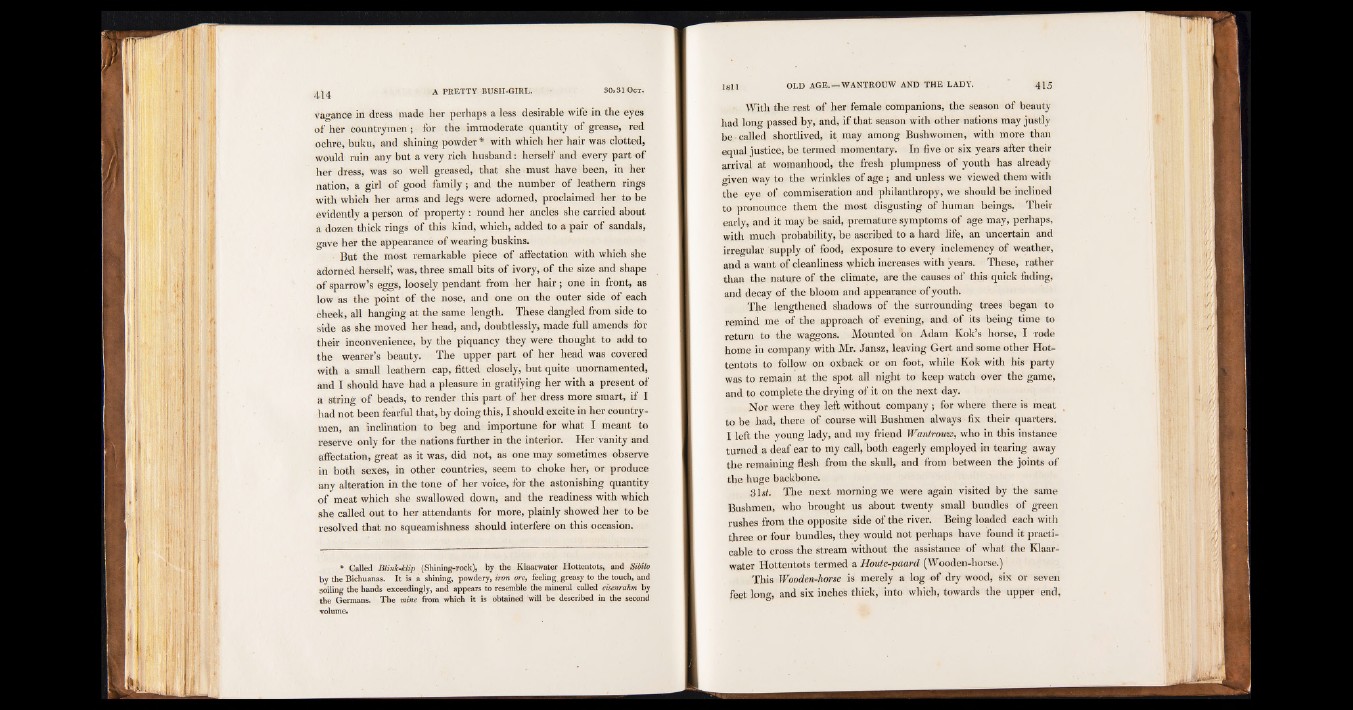
vagance in dress made her perhaps a less desirable wife in the eyes
of her countrymen ; for the immoderate quantity of grease, red
ochre, buku, and shining powder * with which her hair was clotted,
would ruin any but a very rich husband: herself and every part of
her dress, was so well greased, that she must have been, in her
nation, a girl of good family; and the number of leathern rings
with which her arms and legs were adorned, proclaimed her to be
evidently a person of property : round her ancles she carried about
a dozen thick rings of this kind, which, added to a pair of sandals,
gave her the appearance of wearing buskins.
But the most remarkable piece of affectation with which she
adorned herself, was, three small bits of ivory, of the size and shape
of sparrow’s eggs, loosely pendant from her h a ir; one in front, as
low as the point of the nose, and one on the outer side of each
cheek, all hanging at the same length. These dangled from side to
side as she moved her head, and, doubtlessly, made full amends for
their inconvenience, by the piquancy they were thought to add to
the wearer’s beauty. The upper part of her head was covered
with a small leathern cap, fitted closely, but quite unomamented,
and I should have had a pleasure in gratifying her with a present of
a string of beads, to render this part of her dress more smart, if I
had not been fearful that, by doing this, I should excite in her country*
men, an inclination to beg and importune for what I meant to
reserve only for the nations further in the interior. Her vanity and
affectation, great as it was, did not, as one may sometimes observe
in both sexes, in other countries, seem to choke her, or produce
any alteration in the tone of her voice, for the astonishing quantity
of meat which she swallowed down, and the readiness with which
she called out to her attendants for more, plainly showed her to be
resolved that no squeamishness should interfere on this occasion.
* Called Blink-Hip (Shining-rock), by the Klaarwater Hottentots, and Sibtlo
by the Bichuanas. I t is a shining, powdery, iron ore, feeling greasy to the touch, and
soiling the hands exceedingly, and appears to resemble the mineral called eisenrahm by
the Germans. The mine from which it is obtained will be described in the second
volume.
With the rest of her female companions, the season of beauty
had long passed by, and, if that season with other nations may justly
be called shortlived, it may among Bushwomen, with more than
equal justice, be termed momentary. In five or six years after their
arrival at womanhood, the fresh plumpness of youth has already
given way to the wrinkles of age ; and unless we viewed them with
the eye of commiseration and philanthropy, we should be inclined
to pronounce them the most disgusting of human beings. Their
early, and it may be said, premature symptoms of age may, perhaps,
with much probability, be ascribed to a hard life, an Uncertain and
irregular supply of food, exposure to every inclemency of weather,
and a want of cleanliness which increases with years. These, rather
than the nature of the climate, are the causes of this quick fading,
and decay of the bloom and appearance of youth.
The lengthened shadows of the surrounding trees began to
remind me of the approach of evening, and of its being time to
return to the waggons. Mounted on Adam Kok’s horse, I rode
home in company with Mr. Jansz, leaving Gert and some other Hottentots
to follow on oxback or on foot, while Kok with his party
was to remain at the spot all night to keep watch over the game,
and to complete the drying of it on the next day.
Nor were they left without company ; for where there is meat
to be had, there of course will Bushmen always fix their quarters.
I left the young lady, and my friend Wantrouw, who in this instance
turned a deaf ear to my call, both eagerly employed in tearing away
the remaining flesh from the skull, and from between the joints of
the huge backbone.
31st. The next morning we were again visited by the same
Bushmen, who brought us about twenty small bundles of green
rushes from the opposite side of the . river. Being loaded each with
three or four bundles, they would not perhaps have found it practicable
to cross the stream without the assistance of what the Klaarwater
Hottentots termed a Houte-paard (Wooden-horse.)
This Wooden-horse is merely a log of dry wood, six or seven
feet long, and six inches thick, into which, towards the upper end,